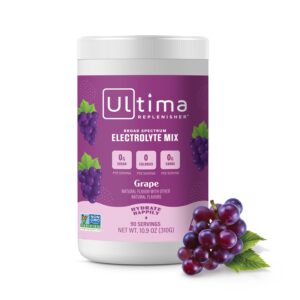My Top 3 Most Important Health Supplements for overall Health and Wellness + Bonus 3
“Discover My Top 3 Essential Health Supplements for Optimal Wellness” In this informative video, join me as I reveal my top three most important health supplements for achieving and maintaining overall health and wellness. Unlock the secrets to optimal health with my carefully curated selection of essential supplements. Discover how these powerhouse nutrients can enhance your well-being and vitality. On our journey through the realm of essential health supplements, remember that these are just a few of the many powerful tools available to support your health journey. Stay tuned for more tips, tricks, and insights on achieving your optimal state of well-being. Join me as we unlock the potential of these essential health supplements and embark on a journey towards vibrant health and vitality. Don’t miss out on the opportunity to take your wellness to the next level with these top three health supplements. Remember, your health is your greatest asset. Invest in it wisely with these essential supplements. Stay tuned for more health and wellness tips, and remember to prioritize your well-being every step of the way.
Benefits of Multi Collagen Protein Powder
Multi collagen protein powder, which typically contains a blend of collagen types sourced from different animal and marine sources, offers several potential benefits:
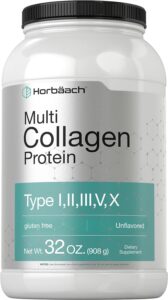
- Supports Joint Health: Collagen is a major component of cartilage, the tissue that cushions joints. Consuming collagen may help maintain joint health and reduce joint pain and stiffness, especially in individuals with conditions like osteoarthritis.
- Promotes Skin Health: Collagen is essential for maintaining the structure and elasticity of the skin. Regular intake of collagen may help reduce wrinkles, improve skin hydration, and promote a more youthful appearance.
- Strengthens Hair and Nails: Collagen is a key component of hair and nails. Supplementing with collagen may help strengthen hair strands, reduce hair breakage, and promote healthy nail growth.
- Supports Bone Health: Collagen provides structural support to bones and helps maintain bone density. Consuming collagen may contribute to bone strength and reduce the risk of conditions like osteoporosis.
- Aids Muscle Recovery: Collagen contains amino acids like glycine and proline, which are important for muscle repair and recovery. Including collagen in your post-workout routine may help support muscle recovery and reduce muscle soreness.
- Gut Health: Collagen contains the amino acid glycine, which supports the production of stomach acid and may help repair the intestinal lining. Some people find that collagen supplementation can improve digestion and alleviate symptoms of conditions like leaky gut syndrome.
- Supports Weight Management: Collagen is a protein-rich supplement that can help increase feelings of fullness and promote satiety. Including collagen in your diet may help support weight management by reducing appetite and cravings.
- Promotes Overall Well-being: Collagen is involved in many essential bodily functions, including wound healing, tissue repair, and maintaining the integrity of connective tissues throughout the body. Consuming collagen regularly may contribute to overall health and well-being.
Benefits of Multi B Vitamin – Super B-Complex
Multi B vitamin supplements, also known as Super B-Complex, offer a wide range of potential benefits due to the essential roles that B vitamins play in various bodily functions. Here are some of the benefits:
- Energy Production: B vitamins, including B1 (thiamine), B2 (riboflavin), B3 (niacin), B5 (pantothenic acid), B6 (pyridoxine), and B12 (cobalamin), are crucial for converting food into energy. They participate in the metabolism of carbohydrates, fats, and proteins, helping the body produce energy.
- Supports Nervous System Function: B vitamins play a vital role in maintaining a healthy nervous system. They are involved in the synthesis of neurotransmitters, the chemical messengers that transmit signals between nerve cells. Adequate B vitamin intake supports cognitive function and may help reduce the risk of neurological disorders.
- Promotes Healthy Skin, Hair, and Nails: B vitamins, particularly biotin (B7) and niacin (B3), contribute to the maintenance of healthy skin, hair, and nails. They support the
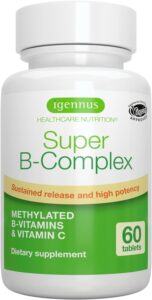
Super B-Complex production of keratin, a protein that forms the structure of hair, skin, and nails, promoting their strength and appearance.
- Supports Red Blood Cell Formation: Vitamin B12, along with folate (B9) and B6, is essential for the formation of red blood cells. These vitamins play a crucial role in the synthesis of DNA and RNA, which are necessary for the production of healthy red blood cells. Adequate B vitamin intake helps prevent anemia and supports optimal oxygen transport in the body.
- Mood Regulation: B vitamins, particularly B6, B12, and folate, are involved in the synthesis of neurotransmitters such as serotonin, dopamine, and norepinephrine, which regulate mood and emotional well-being. Adequate intake of B vitamins may help support a positive mood and reduce the risk of depression and anxiety.
- Heart Health: Certain B vitamins, such as B6, B12, and folate, play a role in regulating homocysteine levels in the blood. Elevated homocysteine levels are associated with an increased risk of cardiovascular disease. B vitamins help convert homocysteine into other substances, potentially reducing the risk of heart disease.
- Supports Digestive Health: B vitamins, particularly B1, B2, B3, and B6, support digestive function by aiding in the metabolism of carbohydrates, fats, and proteins. They also support the health of the digestive system’s mucous membranes. Adequate B vitamin intake may help alleviate digestive discomfort and promote overall gastrointestinal health.
- Stress Management: B vitamins, especially B5 and B6, play a role in the body’s stress response by supporting adrenal gland function and the production of stress hormones like cortisol. Adequate B vitamin intake may help the body better cope with stress and maintain overall resilience.
It’s important to note that while B vitamin supplements can be beneficial for many people, they should not replace a balanced diet rich in whole foods. Additionally, individual needs for B vitamins may vary based on factors such as age, gender, health status, and lifestyle habits. Consulting with a healthcare professional can help determine the appropriate dosage and supplementation regimen for your specific needs.
Benefits of Magnesium Glycinate, Malate, Taurate & Citrate, Chelated Forms
Magnesium is an essential mineral that plays a crucial role in numerous physiological processes in the body. Different forms of magnesium, including magnesium glycinate, malate, taurate, citrate, and chelated forms, offer various benefits:
- Magnesium Glycinate:
- High Absorption: Magnesium glycinate is highly bioavailable and well-absorbed by the body, making it an effective form of magnesium supplementation.
- Gentle on the Stomach: Magnesium glycinate is less likely to cause gastrointestinal discomfort or laxative effects compared to other forms of magnesium, making it suitable for individuals with sensitive stomachs.
- Relaxation and Sleep: Magnesium glycinate has calming properties and may help promote relaxation, reduce stress, and improve sleep quality.
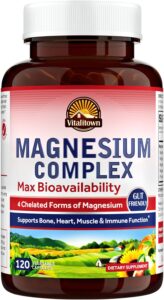
magnesium
- Magnesium Malate:
- Energy Production: Magnesium malate is involved in the production of ATP (adenosine triphosphate), the primary energy currency of the body. It may help support energy metabolism and reduce fatigue.
- Muscle Function: Magnesium malate supports muscle function and may help alleviate muscle cramps and soreness.
- Fibromyalgia Relief: Some research suggests that magnesium malate supplementation may be beneficial for individuals with fibromyalgia, a condition characterized by widespread muscle pain and tenderness.
- Magnesium Taurate:
- Cardiovascular Health: Magnesium taurate may support cardiovascular health by promoting healthy blood pressure and heart function. Taurine, an amino acid, has cardioprotective properties that complement magnesium’s benefits.
- Neurological Health: Taurine has neuroprotective effects and may support brain health. Combining magnesium with taurine may provide cognitive benefits and help protect against neurodegenerative diseases.
- Magnesium Citrate:
- Digestive Health: Magnesium citrate has a laxative effect and is commonly used to relieve constipation. It draws water into the intestines, softening stools and promoting bowel movements.
- Kidney Stone Prevention: Magnesium citrate may help prevent the formation of kidney stones by binding to oxalates in the digestive tract, reducing their absorption and excretion in the urine.
- Chelated Forms of Magnesium (e.g., Magnesium Bisglycinate Chelate):
- Enhanced Absorption: Chelated forms of magnesium, such as magnesium bisglycinate chelate, offer improved absorption and bioavailability compared to non-chelated forms.
- Gentle on the Stomach: Chelated forms of magnesium are less likely to cause gastrointestinal side effects, making them suitable for individuals with digestive sensitivities.
- General Health Support: Chelated forms of magnesium provide the benefits of magnesium supplementation, including support for bone health, muscle function, nerve function, and overall well-being.
It’s essential to choose the form of magnesium that best suits your individual needs and preferences. Additionally, consulting with a healthcare professional can help determine the appropriate dosage and supplementation regimen based on your specific health status and goals.
Benefits of Electrolyte Drink Mix
Benefits of Essential Enzymes
Essential enzymes are proteins that catalyze biochemical reactions in the body, facilitating various physiological processes. They play a crucial role in digestion, metabolism, and overall health. Here are some benefits of essential enzymes:
- Improved Digestion: Enzymes such as amylase, protease, and lipase help break down carbohydrates, proteins, and fats from food into smaller molecules that can be absorbed and utilized by the body. Supplementing with essential enzymes can aid digestion, reduce bloating, gas, and indigestion, and alleviate symptoms of conditions like irritable bowel syndrome (IBS) and lactose intolerance.
- Enhanced Nutrient Absorption: Proper digestion is essential for the absorption of nutrients from food. Enzymes help break down nutrients into forms that can be readily absorbed by the intestines, ensuring optimal nutrient uptake and utilization by the body. This can contribute to overall health, energy levels, and vitality.
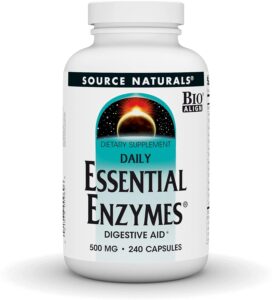
Essential Enzymes - Support for Gut Health: Enzymes play a role in maintaining a healthy balance of gut bacteria and promoting gut motility. They help break down dietary fibers and other indigestible substances, reducing the risk of constipation, bloating, and other digestive discomforts. A healthy gut microbiome is essential for immune function, mood regulation, and overall well-being.
- Reduced Digestive Discomfort: Enzyme deficiencies or imbalances can lead to digestive problems such as gas, bloating, reflux, and abdominal pain. Supplementing with essential enzymes can help compensate for deficiencies and support optimal digestion, reducing discomfort and promoting gastrointestinal health.
- Alleviation of Food Sensitivities: Some individuals may experience difficulty digesting certain foods due to enzyme deficiencies or sensitivities. For example, lactase deficiency can lead to lactose intolerance, while alpha-galactosidase deficiency can cause difficulties digesting beans and cruciferous vegetables. Enzyme supplements can help alleviate symptoms associated with food sensitivities by aiding in the digestion of specific nutrients.
- Support for Aging and Enzyme Decline: Enzyme production naturally declines with age, leading to reduced digestive efficiency and nutrient absorption. Supplementing with essential enzymes can help compensate for age-related enzyme decline, supporting healthy digestion and nutrient uptake in older adults.
- Relief from Enzyme-Depleting Factors: Certain factors such as stress, medications, alcohol consumption, and processed foods can deplete enzyme levels in the body. Supplementing with essential enzymes can help restore enzyme balance and support digestive function in individuals exposed to enzyme-depleting factors.
- Promotion of Weight Management: Proper digestion and nutrient absorption are essential for maintaining a healthy weight. By supporting optimal digestion and metabolism, essential enzymes can help promote weight management goals and overall metabolic health.
It’s important to choose high-quality enzyme supplements that contain a broad spectrum of enzymes, including proteases, lipases, amylases, lactases, and cellulases, to support comprehensive digestive function. Additionally, consulting with a healthcare professional can help determine the appropriate enzyme supplementation regimen based on individual needs and health status.
Benefits of Omega 3 Fish Oil Supplements
Omega-3 fish oil supplements are derived from fatty fish such as salmon, mackerel, sardines, and trout, and they are rich in two essential fatty acids: eicosapentaenoic acid (EPA) and docosahexaenoic acid (DHA). These fatty acids offer numerous health benefits:
- Heart Health: Omega-3 fatty acids have been extensively studied for their cardiovascular benefits. They can help reduce triglyceride levels, lower blood pressure, decrease inflammation, improve blood vessel function, and reduce the risk of heart disease and stroke.
- Brain Function: DHA, in particular, is a major component of brain tissue and plays a crucial role in brain development and function. Omega-3 fatty acids are associated with improved cognitive function, memory, and mood regulation. They may also reduce the risk of age-related cognitive decline and neurodegenerative diseases like Alzheimer’s disease.
- Eye Health: DHA is abundant in the retina of the eye, where it contributes to visual development and function. Omega-3 fatty acids may help reduce the risk of age-related macular
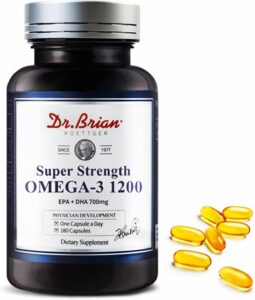
Dr Brian Omega 3 degeneration (AMD), a leading cause of vision loss in older adults.
- Inflammation Reduction: Omega-3 fatty acids possess anti-inflammatory properties, which can help reduce inflammation throughout the body. Chronic inflammation is linked to various health conditions, including arthritis, inflammatory bowel disease (IBD), and metabolic syndrome. Omega-3s may help alleviate symptoms and improve outcomes in individuals with inflammatory conditions.
- Joint Health: EPA and DHA have been shown to reduce joint pain and stiffness, improve joint function, and slow the progression of osteoarthritis. Omega-3 fatty acids may help reduce inflammation in the joints, providing relief for individuals with arthritis and other joint-related conditions.
- Skin Health: Omega-3 fatty acids support skin health by promoting hydration, reducing inflammation, and protecting against sun damage. They may help alleviate symptoms of skin conditions like eczema, psoriasis, and acne, and contribute to a healthy, glowing complexion.
- Pregnancy and Infant Development: Omega-3 fatty acids are crucial for fetal development, particularly for the development of the brain, eyes, and nervous system. Pregnant women who consume omega-3 fish oil supplements may help support the healthy development of their baby’s brain and reduce the risk of preterm birth.
- Improved Lipid Profile: Omega-3 fatty acids can help increase levels of high-density lipoprotein (HDL) cholesterol, often referred to as “good” cholesterol, while reducing levels of low-density lipoprotein (LDL) cholesterol and triglycerides. This favorable alteration in lipid profile can contribute to overall cardiovascular health.
Omega-3 fish oil supplements are generally safe for most people when taken as directed. However, individuals who are allergic to fish or seafood, have bleeding disorders, or take blood-thinning medications should consult with a healthcare professional before starting supplementation. Additionally, quality and purity are important considerations when choosing omega-3 supplements to ensure they are free from contaminants such as mercury and PCBs.
This article is for informational purposes only and should not be taken as medical advice.
the information presented in the article is not a substitute for professional medical advice.
seek guidance from a qualified medical professional for personalized health concerns.
We are not liable for any risks or issues associated with acting upon the information provided in the article .
Copyright Disclaimer Under Section 107 of the Copyright Act 1976, allowance is made for “fair use” for purposes such as criticism, commenting, news reporting, teaching,
scholarship, and research. Fair use is a use permitted by copyright statute that might otherwise be infringing. Non-profit, educational, or personal use tips the balance in favor of
fair use.




